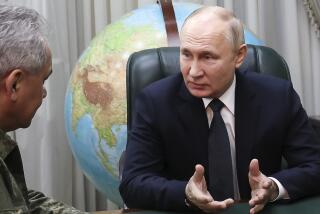Soviets Inspect Chemical Arms Depot in Utah
- Share via
TOOELE ARMY DEPOT, Utah — A Soviet delegation inspected the United States’ largest chemical weapons arsenal Thursday as part of a joint superpower program to help pave the way for a treaty on chemical weapons.
The head of the Soviet group predicted that a weapons limitation agreement could come soon, but his U.S. counterpart said potential stumbling blocks remain.
The team of six scientists and diplomats led by Yuri K. Nazarkin, ambassador to the Disarmament Conference in Geneva, was allowed to view each type of chemical weapon and agent stored at the depot.
Today, the Soviets are to observe the Chemical Agent Munitions Disposal System, a self-contained incineration plant, where about 38,000 weapons, most of them made during the 1950s and ‘60s, have been destroyed since 1979.
A U.S. team, led by Ambassador Max Friedersdorf, last month visited a facility in Shikhany, in the northern region of the Russian Federation, where Soviet chemical weapons are destroyed.
“We believe this exchange of visits facilitates the atmosphere of confidence at negotiations on chemical weapons, which are now at final stage,” Nazarkin said.
But Friedersdorf discounted the Soviet statement, saying Nazarkin has been making such remarks since mid-summer in an apparent effort to influence congressional action on production of a new generation of binary weapons.
“I think that’s overly optimistic,” Friedersdorf said. “There has been progress this year, but there remains an awful lot of detail before a treaty can be concluded.”
“It’s going to be very difficult to sign a treaty” without on-site inspection at any facility within 48 hours of a request, he said, and without knowing what types and amounts of chemical weapons the Soviets have produced and where they are stored.
The visits to Shikhany and to the Tooele Army Depot in the western Utah desert are aimed at letting each superpower verify that the other has the ability to destroy its stockpiles of deadly agents and is carrying out the process.
A proposed U.N. ban on chemical weapons has been under discussion for more than a decade, but the progress on reaching agreement has been held up by problems with verifying compliance, the State Department has said.
More to Read
Sign up for Essential California
The most important California stories and recommendations in your inbox every morning.
You may occasionally receive promotional content from the Los Angeles Times.













